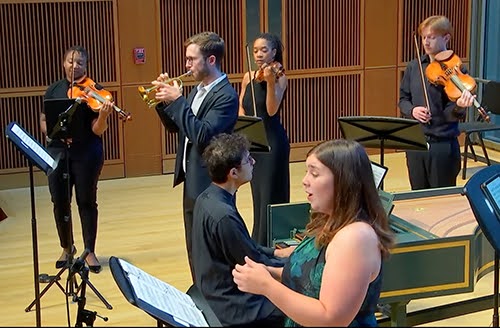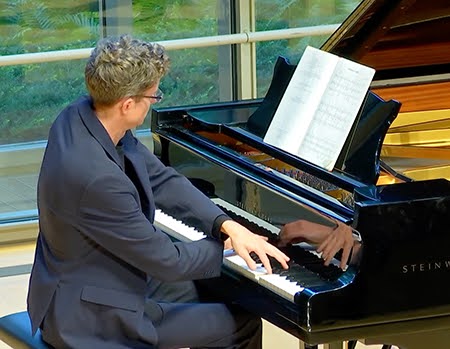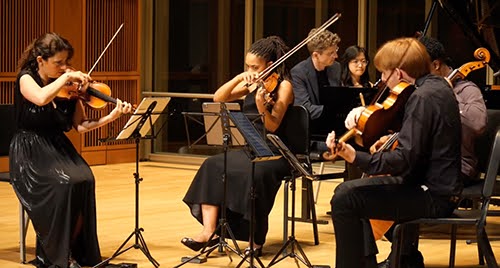by Kevin McLaughlin

A joyful noise opened the concert. J.S. Bach’s Jauchzet Gott in allen Landen featured soprano Sarah Shafer and trumpeter Brandon Ridenour in a sparkling account of the cantata Bach liked so much that he designated it as suitable for performance “in ogni tempo” — at any time.
Shafer poured out long, jubilant runs with obvious enjoyment. She also seemed to relish her interactions with Ridenour as the two intertwined, parried, and even high-C’d together without apparent effort. Ridenour, who had melismas of his own to contend with, articulated the double sixteenths so smoothly you might have thought he was bowing — not tonguing — them.
These two could easily have filled a large concert hall, but restraint of volume, tempo and tonal weight suited Mixon Hall’s intimate confines without lacking in effervescence. The quieter movements were adorned by elegant continuo from harpsichordist Roman Rabinovich (who also somehow conducted) and cellist Dane Johansen, an engine of rhythmic precision. The closing Alleluja tilted upward to new levels of exultancy, thanks to Shafer and Ridenour and the ebullient violin playing of Tai Murray.
A solo piano work, Thomas Adès’s Darknesse Visible, was a subtle showpiece for Zoltán Fejérvári, who summoned exotic voices from the keyboard as a sorcerer summons spirits from another world. He imitated birdsong, tolling bells, and flutterings of hummingbird wings — the sum of which coalesced into something reminiscent of Dowland’s 1610 lute song, “In Darkness Let Me Dwell”:
In darknesse let me dwell, the ground shall sorrow be,
The roofe Dispaire to barre, all cheerful light from me …
Fejérvári also captured Adès’s canvas of light and darkness — sudden sforzandi piercing low, stagnant bass chords, like shafts of light penetrating the gloom.
William Bolcom’s 1969 rag cycle The Garden of Eden was delivered with crispness and jazz vitality by piano duo Yaron Kohlberg and Zoltán Fejérvári. An olden tale, maybe the oldest, it follows a raggedy “Old Adam,” and a seductive and conventional Eve (“The Eternal Feminine,”). The fallout from “The Serpent’s Kiss” — a combination of New York stride, rag, toccata, and the old soft shoe — continues until “Through Eden’s Gates” has Adam and Eve patching things up and finding marital bliss.
Mieczysław Weinberg’s 1944 Piano Quintet in f, Op. 18, was something of a revelation, and stylistically hard to pin down. A Polish Jew, Weinberg found refuge during World War II in Moscow thanks in part to Shostakovich, with whom Weinberg would form a lifelong bond. Though Weinberg’s Piano Quintet bears some likeness to Shostakovich’s Quintet, Op. 57 (1940), a more complete comparison would perhaps also include Szymanowski and Bartók — not to mention Holst, but we’ll get to that in a minute.
The playing by this bunch (pianist Zoltán Fejérvári, violinists Diana Cohen and Njioma Grevious, violist Samuel Rosenthal, and cellist Sterling Elliott) was strong, accurate, and fierce. They didn’t confuse force with speed, building power from accumulated energy rather than over-exertion. They played the first movement as if in homage to Weinberg’s friend Shostakovich, melancholic and sweet — though as it grew thornier, the players seemed to assert stylistic rebellion, using a coarser tone and articulation.
The following Allegretto sounded like a dream, though more of a nightmare than a contented one. The third movement Presto rebelled again, like a mutinous waltz teetering out of control; the long Largo was grim — even if some of the tenderness of the first movement is recalled; and the finale Allegro agitato was exciting but also fearful. The big surprise, though, was the sudden Scottish jig, which the group played with Holst-like glee before ending submissively quiet.
Published on ClevelandClassical.com July 1, 2024.
Click here for a printable copy of this article




